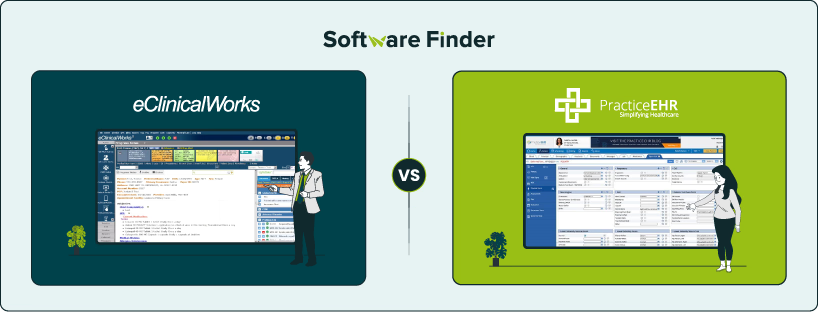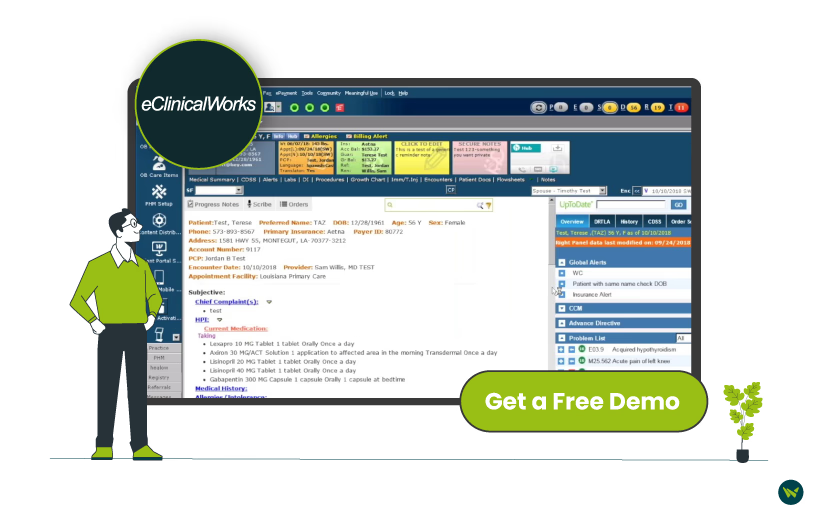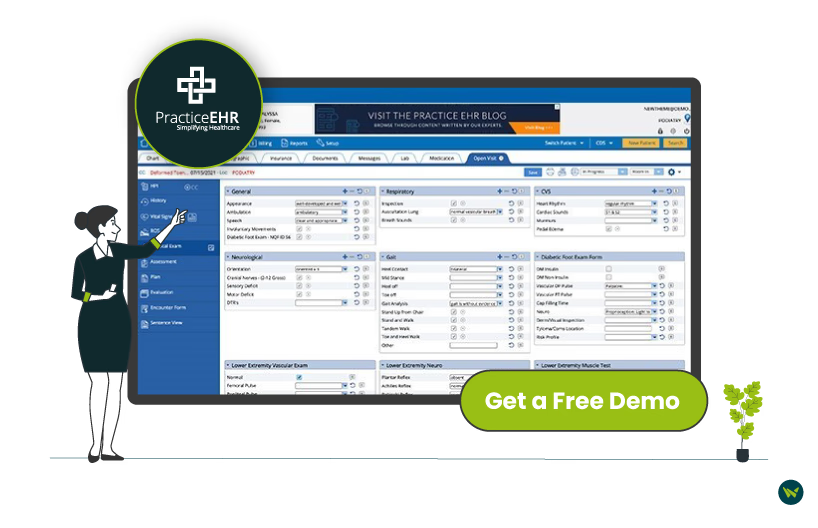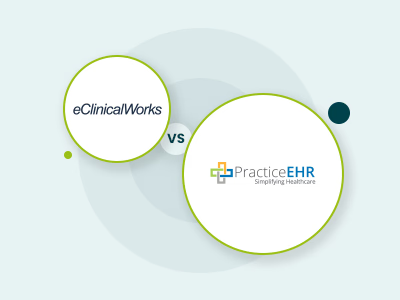
| Starting Price: $449/month/provider | Starting Monthly Price: $179/month/provider |
| Best for: Ambulatory Care | Best for: Internal Medicine, Cardiology, Dermatology |
| Mobile App: iOS, Android | Mobile App: iOS, Android |
| Rating: 3.4 | Rating: 4.4 |
| *Disclaimer: Pricing is subject to change. | *Disclaimer: Pricing is subject to change. |
Choosing the right electronic health records (EHR) system is more than a technology decision—it’s a long-term investment that directly affects patient care, workflow efficiency, and overall clinical operations. The wrong choice can lead to frustrated staff, financial setbacks, and even compliance issues.
That’s why modern practices are leaning on reliable systems that simplify day-to-day processes and support long-term growth. Among the popular options available today, eClinicalWorks and Practice EHR stand out as trusted names for small to mid-sized healthcare providers.
This blog will provide an in-depth comparison of eClinicalWorks vs Practice EHR, analyzing their key differences, features, and pricing structures to help you make a well-informed decision.

eClinicalWorks is a widely recognized cloud-based EHR solution, primarily serving independent physician practices across various ambulatory specialties. It is trusted by over 850,000 healthcare professionals and ranked #1 in ambulatory EHR market share for freestanding practices. Notably, it was also recognized as the most improved product in the 2024 KLAS report. This all-in-one AI-powered EHR and practice management platform offers a range of features, including billing, scheduling, telehealth, and more.

Practice EHR is a cloud-based solution designed especially for small practices across multiple specialties. It’s an all-in-one AI-powered EHR platform that handles all healthcare clinic tasks by offering several features, including billing, claims submission, scheduling, documentation automation, and more.
Feature | eClinicalWorks | Practice EHR |
Cloud Access | ✓ | ✓ |
Scheduling | ✓ | ✓ |
Medical Billing | ✓ | ✓ |
Telehealth | ✓ | ✓ |
Reporting | ✓ | ✓ |
Document Management | ✓ | ✓ |
Integration | ✓ | ✓ |
Mobile Access | ✓ | ✓ |
Compliance | ✓ | ✓ |
Support Options | ✓ | ✓ |
| PROS | |
|
|
| CONS | |
|
|


eClinicalWorks offers three pricing plans, including:
- EHR Only – $449/month/provider
- EHR with Practice Management – $599/month/provider
- RCM as a Service – 2.9% of practice collections
Meanwhile, Practice EHR offers an extensive and detailed pricing plan for its EHR, practice management (PM), and revenue cycle management (RCM) services. It provides the following three pricing plans for its EHR solutions:
- EHR Essential – $179/month/provider (billed annually)
- EHR Pro – $329/month/provider (billed annually)
- EHR Elite – Custom pricing
Additionally, Practice EHR offers the following three pricing plans for its EHR + PM solutions:
- EHR + PM Essential – $299/month/provider (billed annually)
- EHR + PM Pro – $449/month/provider (billed annually)
- EHR + PM Elite – Custom pricing
Meanwhile, the Practice EHR includes the following three RCM plans with custom pricing options for each:
- Practice Essential
- Practice Pro
- Practice Elite
When it comes to pricing, both platforms cater to different priorities. eClinicalWorks offers a more streamlined model with fixed-rate options and a percentage-based RCM plan, which may suit practices looking for predictable, all-in-one pricing.
On the other hand, Practice EHR offers a tiered structure with modular pricing for EHR, PM, and RCM, providing smaller or specialized practices with the flexibility to select services based on their specific operational needs. Ultimately, the right pricing model will depend on the size, budget, and service expectations of your practice.
Disclaimer: The pricing is subject to change.
Many users appreciate eClinicalWorks due to its robust suite of features for billing, scheduling, and documentation, with several noting its customizable templates and seamless third-party integrations as major strengths. However, common drawbacks include excessive clicking to perform specific tasks, such as navigating through the click-through documentation flow.
Practice EHR, on the other hand, is often recognized for its intuitive layout and ease of use. Users particularly value its efficient billing tools, minimal menu navigation, and responsive support team. That said, some have reported occasional system errors, such as issues with printing paper claims and limitations when undoing patient check-ins.
eClinicalWorks and Practice EHR both offer compelling solutions, but their strengths cater to different types of practices. eClinicalWorks stands out with its advanced AI tools, scalable infrastructure, and in-depth reporting capabilities, making it ideal for mid-to-large-sized practices that require sophisticated functionality. Practice EHR, by contrast, is a strong fit for small to mid-sized practices seeking an affordable, easy-to-use system with efficient billing, customizable templates, and reliable support.
Ultimately, the best choice depends on your practice's size, specialty, and long-term goals. Evaluate what matters most, such as automation, usability, cost-efficiency, or support, before making a final decision.
